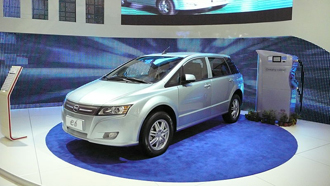BYD, Daimler to Launch Denza Electric Car in 2013
By wchung | 18 Dec, 2025
One of the most promising electric-vehicle technologies will become available to China’s consumers in 2013 with the release of the Denza under a joint venture between Germany’s Daimler and China’s BYD Auto.
The Denza offers several advantages over other electric cars on the market. The most important are its range of about 300 km (186 miles), the capability to be fully charged in 20-30 minutes, its iron-phosphate cathode composition which extends the battery’s life and its safety. Most lithium-ion batteries use cobalt-oxide cathodes which have about 14% higher energy density but degrade over large numbers of charge cycles. Current electric cars like the Nissan Leaf and the Chevy Volt also have far shorter ranges.
The Denza will be produced under a joint venture formed in March 2010 under which Daimler invested 600 million yuan ($95 million). The venture is based out of BYD’s Shenzhen production base.
The Denza will presumably incorporate the venture’s experience with the E6, a 4,500-pound crossover vehicle that has been under field testing in Shezhen since May 2010 as taxis operated by the BYD subsidiary Pengcheng Electric Taxi Co. The test involved 50 E6s. A year after testing began BYD reported that the E6 fleet had collectively logged 1,730,000 miles (2,780,000 km) while continuously quick-charging in 20 to 30 minutes without showing any diminished range or drop in battery performance.
If true, that is a powerful endorsement for the advantages of BYD’s iron-phosphate battery technology. US investment guru Warren Buffet was so deeply impressed by BYD’s technology that in March of 2011 he announced a $232 million investment in BYD for a 10% stake.
Armed with that infusion, in October 2011 BYD began selling the E6 to the general public at a price of 369,800 yuan ($57,000). Government subsidies reduced the effective price to 249,800 yuan ($38,700). The consumer version offered remote control of various car functions like air conditioning and door locks via their cell phones. In two months BYD sold 309 E6s, mostly to fleets for rentals.
Recently BYD founder and chairman Wang Chuanfu expressed the view that his company will be the world leader in automotive batteries by 2025. If the results announced through E6 testing can be translated into mass-produced consumer-quality cars, Wang’s optimism may be well founded. The biggest hurdle to BYD’s ability to ramp up production is the scarcity of charging infrastructure. That was the reason the company cited for delaying by 18 months its original plan to begin selling is electrics in the US last fall.

The all-electric e6 built by BYD in a joint venture with Daimler will serve as the foundation for the Denza to be released in China in 2013.
Asian American Success Stories
- The 130 Most Inspiring Asian Americans of All Time
- 12 Most Brilliant Asian Americans
- Greatest Asian American War Heroes
- Asian American Digital Pioneers
- New Asian American Imagemakers
- Asian American Innovators
- The 20 Most Inspiring Asian Sports Stars
- 5 Most Daring Asian Americans
- Surprising Superstars
- TV’s Hottest Asians
- 100 Greatest Asian American Entrepreneurs
- Asian American Wonder Women
- Greatest Asian American Rags-to-Riches Stories
- Notable Asian American Professionals

